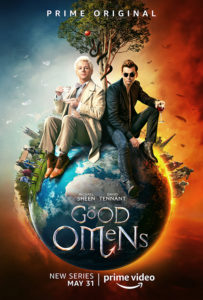Good Omens a Not-So-Good Adaptation

As the legislative director and lobbyist for the American Humanist Association, I typically write about public policy, politics, and advocacy. While I love writing about these topics, I felt a change was in order as Amazon has made one of my favorite books from my teenage years, Good Omens, into a new TV show.
Good Omens is the story of an angel named Aziraphale (Michael Sheen) and a demon by the name of Crowley (David Tennant), who are responsible for supervising elements of humanity on the command of their respective masters, God (Francis McDormand) and (who’s never seen or heard from). Over the millennia, the supernatural duo end up finding that they have more in common with each other than with their bosses back home, and develop a begrudging friendship. This friendship is tested when the Antichrist (played by multiple actors) arrives on Earth to bring about Armageddon (the subjugation of humanity or its final judgement, depending on which side you’re on). As Crowley and Aziraphale have grown more attached to Earth, humanity, and material comforts, the duo decide to work together to sabotage the respective divine and infernal plans so as to preserve the earth, its inhabitants, and all the nice creature comforts they desire.
In theory, Good Omens has everything going for it. The writer of the show is Neil Gaiman, who co-wrote the original 1990 book with Terry Pratchett and has spearheaded several successful adaptions of his literary works, from American Gods to Coraline to Neverwhere and Stardust. The fact that the writing would be close to the original seemed to be a surefire recipe for success, especially since the cast of the show is so strong and the production is well-funded (Amazon shelled out some big Bezos bucks to make this adaption happen).
Unfortunately, the show lacks the magic of the books and Gaiman’s other adaptations. From the hectic pace of the plot development, which overlooks the morsels of humor and mysticism found in the book, to the overly stylized lighting and set design which distracts from the narrative, Good Omens just feels…off. One of the main reasons I loved Good Omens was because it felt like the cultural successor to Douglas Adams’s Hitchhikers’ Guide to the Galaxy, in that it attempts to explain our place in the universe through humor and a bit of mysticism, and gives insights into human nature through both our own actions and the actions of those who are distinctly not human. Both books allowed one to marvel and laugh at the universe simultaneously, but were still heady enough to make the reader question and even potentially ridicule their own beliefs. To humanists, nothing could be a more worthwhile than taking a cheeky look at life, the universe, and everything, which is why I was so excited for the TV adaption of Good Omens.
Obviously, adapting any book to TV or film is challenging and the audience will always be displeased by some personal atrocity or another, but Gaiman has been especially good at crossing this divide in the past. Some scenes feel especially disjointed or even wrong, such as the infamous moment in which Crowley passes by a work outing for a local company at a paintball range, transforming the relatively harmless guns into real weapons, supposedly allowing employees to fulfill their innate desire to murder their coworkers. Even though Crowley ends up ensuring that no one really dies (an action Aziraphale attributes to Crowley being nice deep down) the entire scene feels horrid and out-of-touch in our current climate of school and workplace violence.
The removal of Nanny Ashtoreth as the caretaker of the budding Antichrist, to be replaced by a Mrs. Doubtfire-version of Crowley, is also a significant error, as Tennant is clunky in the role and Ashtoreth’s evil isn’t easily replicated.
Overall, while much of the mystery and wonder of the book can be found in the show, the main element that made the book great, its humor, is hard to find. Perhaps that is because the original text’s co-author, Pratchett, died several years ago and didn’t contribute to the project. While Gaiman himself is a wonderfully funny author, Pratchett’s sense of humor was of a different kind, and is definitely missing from the TV adaptation. Sadly, this absence makes the show into something that is simply enjoyable but not nearly as compelling, intriguing, or insightful as the book.
